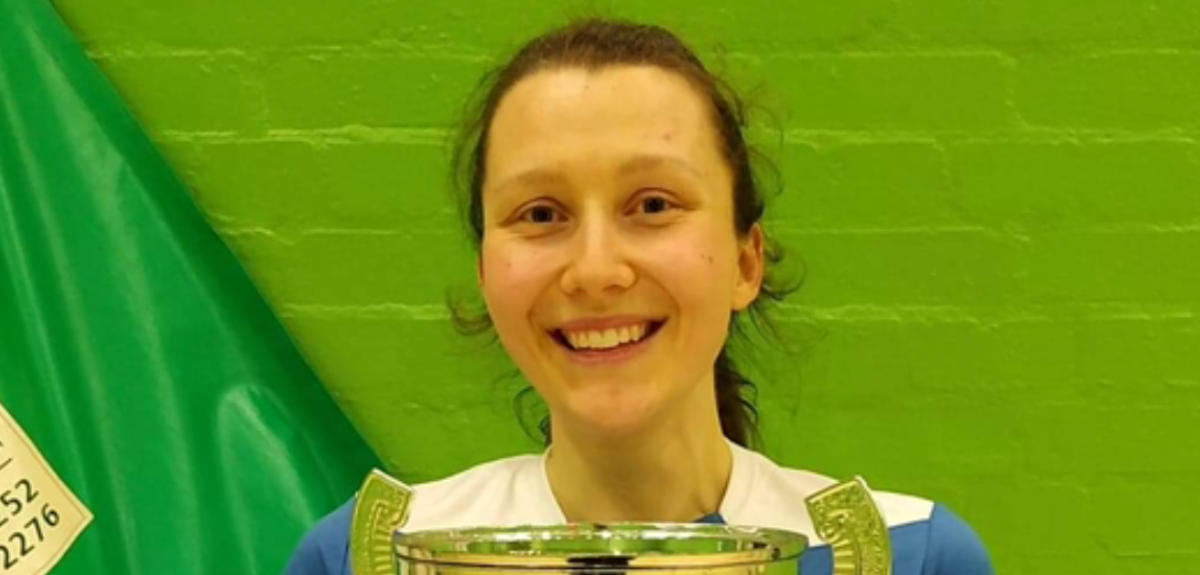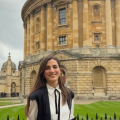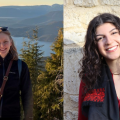
Student Stories: Diversifying sport at Oxford
Anežka Macey-Dare is a DPhil Medical Sciences student at Green Templeton College and this year's Sports Council Chair and Sport Welfare and Inclusion Officer for Oxford University Sport. Here Anežka tells us about her role and the importance of increasing diversity in sport at Oxford.
The Journey so far
Oxford is actually my hometown(!), though I did my undergrad in London. I am a bit of a sports fanatic, (both as an athlete and a fan!), playing in the GB student korfball team, and five University sports teams during my time here, as well as dabbling in college rowing and long-distance marathon running. I was also lucky enough to volunteer at both the men’s Euros 2020, and women’s Euros 2022.
I have held several previous related roles at Imperial and Oxford, including executive committee and welfare positions in the basketball/korfball clubs, being a hall senior for many years at a large diverse, mixed undergraduate hall in London, and more recently being the VP Welfare at my college. I am deeply invested in supporting the sports community, and love giving back through taking on roles such as this one, where I can use my previous experience and skills to help others.
Why did you want to take on the role as Sports Inclusion Officer?
This role combines many areas that are important and interesting, including leadership, welfare, diversity and inclusion. As both a medical student and avid athlete, I am passionate about mental and physical health and wellbeing achieved through competitive, fun and inclusive sport. Having played in multiple teams and across all levels, from total beginner to international, I am particularly interested in how we can widen participation and better inclusion in sport.
Tell us about the role
This role entails working with the other members of the Sports Council to be key voices for the student taking part in sport at Oxford, and to help further improve the student sporting experience. The Welfare and Inclusion Officer roles involve making a positive contribution in these two areas over the year. For me, this has looked like devising and working on various projects, with the brilliant support of my role mentors at the University's Sports Federation.
What have you been working on so far?
Some examples of projects so far include producing resources including a practical guide to making your sports club more inclusive, a list of key welfare resources, and a calendar of key welfare and inclusion dates, with suggestions about how clubs might mark them (eg. organising ‘rainbow’ training sessions during Pride month etc.). I have also launched the ‘Celebrating Diversity in Oxford University Sport Exhibition’ series on the wall at Iffley Road, which celebrated our black-heritage student athletes in conjunction with Black History Month.
Overall, I am really enjoying the role so far, and seeing the positive difference even these small projects have already made.
What facilities does the Iffley Road Sports Centre offer to disabled students?
Iffley Road offers several facilities for disabled students currently, including wheelchairs for wheelchair basketball, functional, adapted toilets and changing facilities, and most recently the installation of a pool pod, to help disabled people access the pool. This is a specialised swimming pool lift developed for the London 2012 Olympic and Paralympic games, which is now transforming pool access and has received lots of positive feedback so far from pool members at Iffley Road.
More widely, Iffley Road offers adaptive sessions and coaching for wheelchair basketball, para-athletics, para-archery, para-swimming, and visually impaired ice-hockey and judo.
Why do you want other students to know about inclusive sport at Oxford?
Sharing about increasing inclusivity is the critical first step in raising awareness about current barriers to inclusion and how they can be addressed, to make Oxford Sport the fully inclusive environment it should be. As I see it, although there have been many commendable positive developments in the past few years, including the recent awarding of the first Blue through the para-athlete pathway, we are still only 1% of the way there.
To focus on disabled athlete inclusion briefly, global championships like the Paralympics, Masters World Championships and recent Wheelchair Rugby World Cup demonstrate the trajectory and standards of inclusive sport in the 21st century, which should be targeted at all levels of sport. Similar standards should be the aim in all other types of inclusion.
What changes have been made so far?
The progress of the Oxford wheelchair basketball club, and recent Oxford v Cambridge women’s visually adjusted ice-hockey match with a ‘noisy’ puck are great signs of what can be achieved if more focus is given to inclusion in sport. As a next step, there should be disabled, masters, mixed and non-exclusive teams available in all Oxford University sports as a matter of routine, and an overall re-orientation towards greater inclusion in all clubs and the Blues Committee.
Looking to the future
The key message I want to share is that it is up to each of us to help make our clubs as inclusive as possible, and that even the smallest actions to increase inclusion go a very long way. That might look like checking in on new players and setting up a development team, speaking to disabled athletes to learning how to increase accessibility of your sport, celebrating key inclusion dates like Black History Month or Pride Month as a club, increasing provisions for trans-athletes, or investing in inclusive kit eg. sports hijabs or specialised swimming caps and replacing light shorts for darker ones to make women feel less anxious.
Inclusion should be at the forefront of every club, so that no matter what gender, race, build, sexual orientation, age or ability someone is, they feel safe, welcomed and included. This all starts with a conversation.
Next steps
Students can learn more about any of the facilities the Iffley Road Sports Centre offers by emailing [email protected], speaking to the Sports Fed team, and visiting the Oxford University Sport Accessible Sport page.
Oxford University Sport and I are always keen to hear about any new ideas individuals or clubs may have about increasing inclusion an accessibility at Iffley Road. If you have any ideas or want to help out with any new/existing projects, please don’t hesitate to drop us an email!
Students are also invited to come and try the pool pod for themselves for free, please speak to reception.
 Student story: Finding space for Kosovo at Oxford
Student story: Finding space for Kosovo at Oxford
 Oxford students shortlisted as McCall MacBain Scholarship finalists
Oxford students shortlisted as McCall MacBain Scholarship finalists
 Student story: My time at Oxford has been deeply transformative
Student story: My time at Oxford has been deeply transformative
 Welfare blog: Dealing with imposter syndrome
Welfare blog: Dealing with imposter syndrome
 Student story: Rowing sabbatical officer
Student story: Rowing sabbatical officer